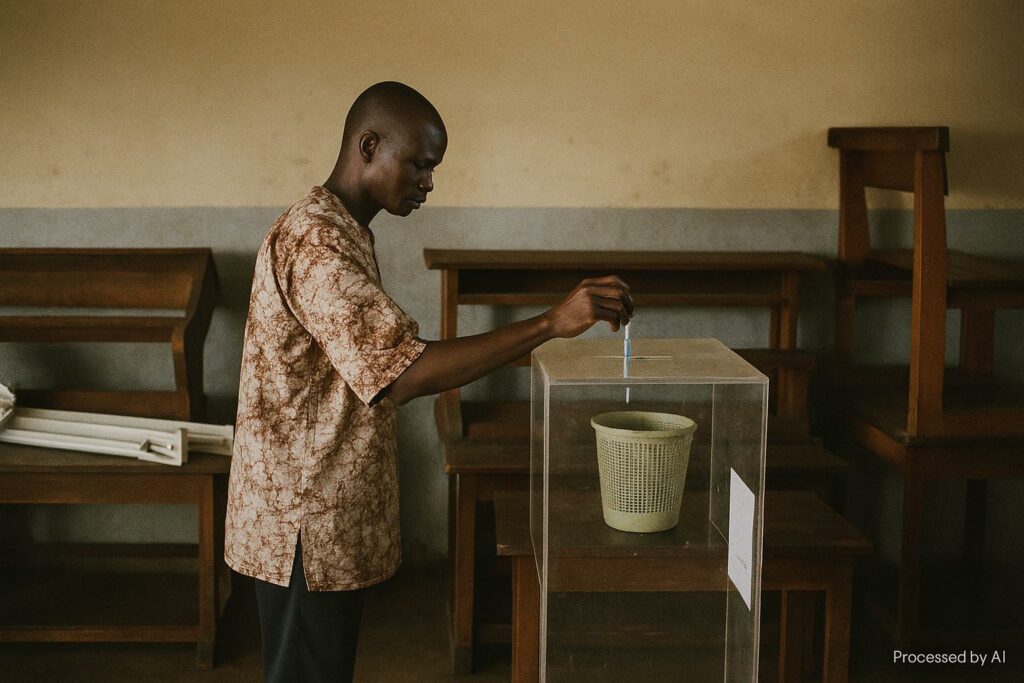Calendar Anchored in Legal Certainty
Brazzaville’s Official Gazette on 7 August carried the Interior Ministry’s decree that synchronises two critical moments in the electoral cycle: the nationwide revision of voter lists from 1 September to 30 October 2025 and the presidential poll on 22 March 2026, with armed-forces personnel casting their votes five days earlier. The timeline is consistent with the constitutional requirement that the Head of State be elected at least forty-five days before the end of the incumbent’s mandate, a provision embedded after the 2015 referendum. National authorities stress that the ten-week window for enrolment will allow the civil registry and the Independent National Electoral Commission to integrate biometric data collected during the 2023 population census, thereby mitigating the litigation that marred the 2016 cycle (Ministry of Interior communiqué, 9 August 2023).
Stakeholder Landscape and Emerging Candidacies
The political class has moved swiftly to position itself. Destin Gavet, leader of the Republican Movement, accepted his party’s nomination in January, pledging a “social contract rooted in macro-economic prudence”. In July, former rebel figure Frédéric Bintsamou—still widely referred to as Pastor Ntumi—secured the flag of the National Republican Council, a move some observers interpret as a bid to translate his Lari-speaking heartland’s influence into national relevance. Within the governing Congolese Labour Party, regional federations have publicly urged President Denis Sassou Nguesso to seek a fifth term, pointing to what they label as macro-stability achievements under his stewardship. The party’s congress, slated for late December, is expected to formalise its choice. Although the Constitution permits two consecutive mandates, jurists recall that the 2015 text reset the counter, an interpretation endorsed by the Constitutional Court in 2021.
Institutional Safeguards and International Observation
Since the 2016 ballot, Brazzaville has multiplied gestures meant to reinforce confidence. The electoral code amended in 2022 entitles each candidate to deploy up to 1 200 polling agents, while the General Directorate of Electoral Affairs has introduced a results-management platform expected to publish precinct-level tallies within six hours of vote-closing. The African Union and ECCAS signalled preliminary readiness to field observer missions, echoing the methodology applied during the 2022 legislative elections, where their joint report stressed “substantial compliance with standards” while recommending enhanced voter education. Western chancelleries in Brazzaville privately acknowledge progress but continue to encourage more inclusive media access, a matter the state broadcasting regulator has since addressed by reserving equal airtime slots during the official campaign period.
Socio-Economic Canvas Framing the Vote
The electoral conversation unfolds against a cautiously improving macro-economic scene. The IMF’s fourth review of the Extended Credit Facility approved in May 2023 projected 4.3 % growth for 2024, aided by disciplined public-finance management and rising oil output. Yet headline inflation hovers near 3 %, and youth unemployment remains a structural concern that candidates are expected to scrutinise. The Pointe-Noire Special Economic Zone, operational since February, offers the incumbent an infrastructure success story, while opposition actors argue that its benefits are slow to reach the interior. Civil-society networks, notably the national chapter of Transparency International, advocate for campaign-finance disclosures to prevent resource-curse dynamics from skewing the contest.
Strategic Implications for Sub-Regional Diplomacy
Congo-Brazzaville’s orderly calendar reverberates beyond its borders. For ECCAS members coping with transitions—from Gabon’s post-coup roadmap to Chad’s constitutional referendum—the prospect of a predictable Brazzaville poll serves as an anchor of continuity. Hydrocarbon-transit negotiations with Angola and Cameroon, as well as the stalled Inga-Brazzaville electricity interconnection, could gain traction once the political horizon is clarified. Diplomats posted in the capital discreetly view the 2026 election as a test of whether Congo can elevate itself from the “post-conflict stability” tag to a model of routine constitutionalism in Central Africa. As one senior AU envoy reflected, “the real victory will be procedural normalisation rather than any single candidature.”

